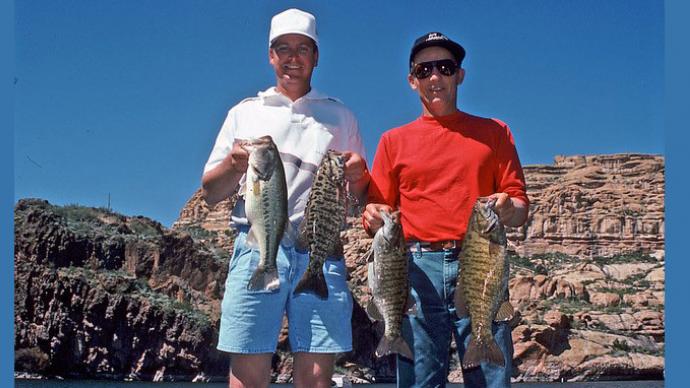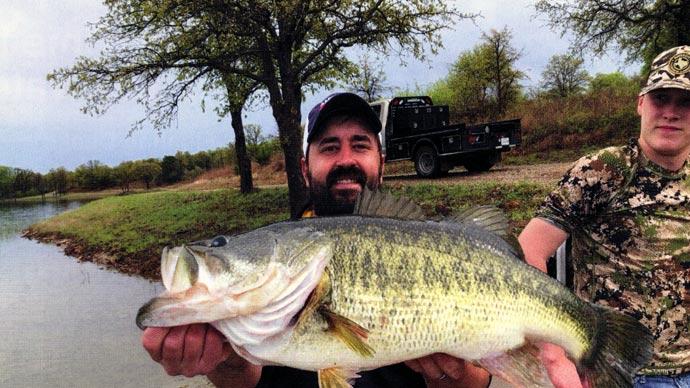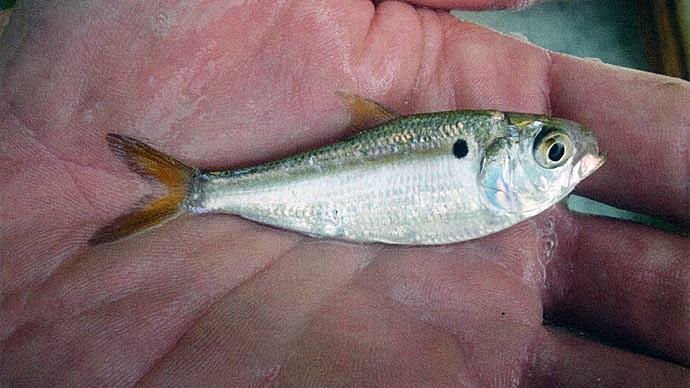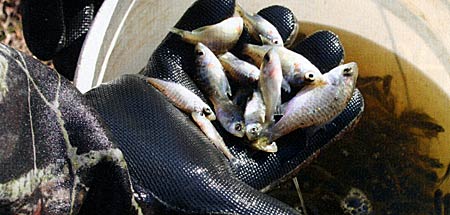
Spring is a great time to stock your new pond, supplement with improved genetics, or to fill a missing slot in your fishery with that size of that species of fish.
How do you source a great fish hatchery?
Buy local, if you can. Here's a key, though. Ask your local fish hatchery where they source their fish. It may surprise you to know that many hatcheries actually buy some of their fish from bigger hatcheries, especially from the biggest ones in Arkansas. That's not a bad thing, but you just need to know, so you can understand what you are buying.
In a perfect world, you'd prefer buying fish raised locally, especially game fish such as bluegills and Largemouth bass. If I'm stocking a lake in upstate New York, I'd rather buy pumpkinseeds, smallmouth bass, walleye, trout, or whatever species, from a nearby hatchery that raised those fish. If that New York hatchery brought bluegills from the south, be aware.
Job One is to decide what species of fish you want to purchase. You've heard the concept caveat emptor; "Let the buyer beware." It's in your best interest to thoroughly investigate your stocking strategy, based on your goals. Once you decide what types of fish and how many you want to stock, then go find your source. Don't assume most any source will suffice. Be picky.
You don't know what you don't know.
It's easy to assume that hatchery, ten miles away, will look out for you. But, that's not always the case. You can buy fish from a fish farm, off a fish truck, or through your private fisheries biologist.
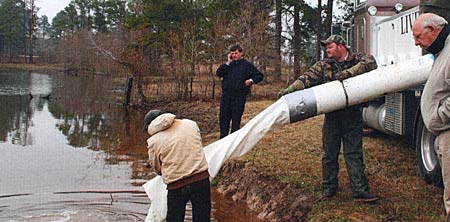
While it's certainly okay to shop price to get the best deal, it's smarter to find someone you can trust, even if you have to pay a little more. Plus, if you trust them and trust their advice, you have added value.
I'll always remember a man who called me way back in the 80's and wanted to come spend a few days learning how to properly handle and cultivate fish, specifically channel catfish. I had leased a fish farm back then. I was happy to have him come and learn on my coattails, and also would appreciate the free labor. As we planned, his mission was to retire from his factory job, start a small fish farm, and fulfill a dream of being a catfish farmer. As we talked during several phone conversations, I told him he'd have a good chance to learn a lot, and all I wanted in return was for him to buy his starter fingerlings from me. I'd buy them from a big producer in Arkansas and split a load with him. I'd make two or three cents each off the fish, deliver them to him, and help stock them into his production ponds. My promise to him was to buy some of his catfish back, after he raised them to size, if he bought his fingerlings through me. His mission was to grow fish big enough to service a local market for people to eat his fish. He spent four days with me, taking lots of notes, asked a jillion questions, and then headed home to take his next steps. He figured it would take at least a year to get his ponds built, and then he'd be ready. I didn't hear from him, and actually pretty much forgot about what he was doing. Two and a half years later, he called me. "Bob, I've got some fish ready to go. You ready to buy some? I need another lesson on how to seine these big fish!" I felt the hair on my neck rise a little bit. My tone reflected those neck hairs, "You were going to buy your fingerling fish through me." His meek answer, "Yeah, but I figured I could save some money going directly to the big hatcheries." My response was, "Okay, well call them and get them to buy your fish." After an awkward pause, he said, "I called them, they aren't interested."
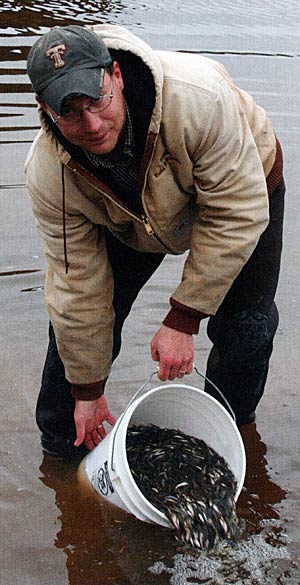
Neither was I. Because he made a deal and didn't keep it, I was no longer interested in helping him. There were lots of people raising catfish, where I'd bought them for several years. He saved a grand total of $500 that I would have made to provide a few dollars to help feed the kids. That $500 cost him my future experience and help (as limited as my experience was). He later apologized, and I offered to come help him for a fee, and buy some fish from him at competitive prices, when I needed some. I'd load up my seine, help him capture and weigh fish, and buy them for a price we both agreed.
My point here is to find someone who's advice you can trust, who will help you years from now when something with your pond goes wrong and you need sound advice. Buy your fish from them. That may be a hatchery, it may be through a pond management company, it may be someone else—just be sure you trust your source to help you later, when you need it.
Here's another true story. Years ago, there was an outlaw from Arkansas who advertised in local newspapers in about 15 different states. His ad headline was, "Free Fish." That crook had a cheesy one-ton fish truck with bald tires, and a cell phone. People would call his number, leave a message, and he'd return the call. His spiel was, "Buy one, get one free." Of course they were free, never mind he doubled the price of that fish you had to buy. Oh, one other thing. He'd deliver the fish to trusting pond owners, fast-talk his way into convincing people they were getting more than they paid for, put some fish in a bucket, dump them in a pond, collect his cash (he only accepted cash), and then be on his merry way. The hatcheries where he bought his fish were suspect, but intimidated by his bully tactics. He ended up getting busted and forced out of business, but not before he cheated an unknown number of people. I actually called the guy several times, and the one time I got a return call, he cussed me out and hung up. When you are ready to stock fish, do you own homework. In today's world, it's way too easy to find out a reputation. Many of us who'd established good reputations came in behind him to clean up his messes. Those pond owners were always embarrassed they fell for that scam.
What's next? Here's another story.
I'll always remember a huge lesson I learned early on. I'd leased a catfish farm in 1980 and needed to stock some catfish fingerlings. Of course, back then all we could do was find lists of fish suppliers, call and talk, and then decide what to do. A1 Gore had not invented the Internet yet, and cell phones were sugar plum visions of some brilliant techno-genius. We had to beat the pavement to make good choices. We needed 50,000 catfish fingerlings to stock our ponds. Most suppliers back then had their 4-6" fish priced at $.08 each. We found a guy who said, "My fingerlings are $.05 each." He was in Missouri, and we could save $1,500 in 1980. We got our equipment ready, headed to Missouri, and the guy had swim-up fry, barely trained to eat fish food—and he was a month behind all the other suppliers south of him in Arkansas. His fish weighed about 2,000 per pound. Those same sized fish, a month earlier, could have been bought for $.02 from other suppliers. We left empty-handed. The lesson? Ask this question,
"How many pounds per thousand are your fish?" Had we bought those fish, our survival rates would have been dismal. A few days later, we bought much larger fish and were glad we did.
Here's your take-home point. Ask how big the fish are, so you can compare apples to apples, especially if you are shopping price. Ask this question, "How many pounds per thousand?" You are asking this—if we count 1,000 fish and weigh them, how much do they weigh?"
If you're one of those good folks who know what you are doing, and don't need the knowledge of an expert, buy fish off a truck—if you trust the truck. Or, maybe you just want a source for fish and you pick a local fish hatchery whose agenda is to sell their fish, regardless of what you think you need. Go for it. My advice there is to be sure you can identify the different species you intend to buy, have a solid understanding of sizes and dollar values, and then place your order.
Okay, so now you've drilled down and wrapped up your due diligence and are ready to buy some fish. You trust your supplier and they have your order in the books.
Your delivery is scheduled and fish stocking day is on the horizon. It will be an event. One of the most exciting times is when the fish truck comes down the driveway.
Be sure you have a good access point. The truck needs to get close to the water and be able to set up a pump to transfer water from your pond to the truck to temper the fish. The fish handler should know what to do to exchange water, and then safely release fish into your pond. One of our favorite things is to get the kids on top of the truck, and let them see, touch, and feel the fish and savor the moment—without compromising fish health, of course.
One last tidbit—when the fish are released, it's common for them to pause, look a little confused, and then bolt for the deep.
The excitement of that day will be embedded in your mind forever. And, if you've done your part, your fish and their future will be exciting.
Reprinted with permission from Pond Boss Magazine

